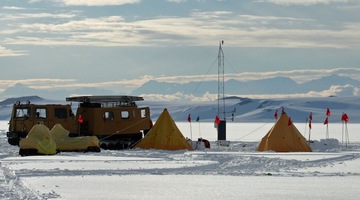Dr Mike Williams from NIWA explains how the research station on the sea ice in McMurdo Sound is set up.
Transcript
DR MIKE WILLIAMS
One of the biggest challenges of working in Antarctica is obviously the cold. And if we’re working in water and the cold, as soon as we pull any instruments out of the water, water will freeze all over them. So to try and avoid this problem we have a laboratory kit which is built out of a shipping container. And we position that container over a hole in the sea ice and we heat the container. So that means that as our instruments come out of the ocean, the water’s not freezing solid on them. The instruments, which have little bits of glass and things like that in them, don’t break, and stuff like that. So they -- the instruments perform better, and it’s much more comfortable for us to work. And we’ve gone further than that. Instead of just having a single lab container, we also have some living containers. So we have a portable kitchen, bunk rooms, and dry laboratories and things like that.
And we have a D6 bulldozer which is a really big bulldozer and that will tow 8 to 9 containers behind it, and we trundle across the sea ice at about 5 to 10 kilometres per hour, so it’s a very slow way to travel, but we’re able to move a lot of stuff.


